© Ortograf Inc. Updated on 14 June 2022. Informations & Contacts.
Here, we describe some Quackle flaws in the endgame. We used version 1.0.4 of Quackle. Our goal is in no way to diminish Quackle or the work that was done by its creators; rather, we want to show what we thought was missing and what motivated us to work on an endgame solver of our own.
We shall see that Quackle gives minimal answers very fast in the endgame and that, while its answers are often correct for simple endgames, its lack of exhaustivity leads to undesirable situations that can’t be fixed by the user, such as:
Note: We tried to contact Quackle developers. Mr Liberty responded to us and fixed the bug where some moves are not generated. Hence, that bug should be fixed in Quackle versions following the 1.0.4.
Warning!
In what follows, some examples have been taken from the showcase page or from the Nigel Richards endgame analysis page. There are spoilers!
Here is an example, using the French tile distribution and the ODS8 lexicon, where Quackle fails to generate all moves.
You lead by 200 points and it's your turn.
Your rack: ?AAMMQS
Your opponent's rack: EEFFV
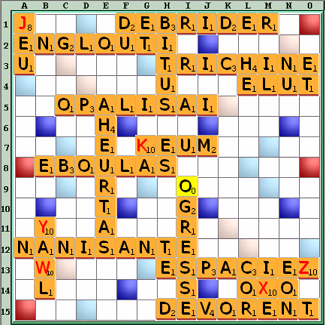
Here are the results of the Generate all choices feature from the Move menu in Quackle:
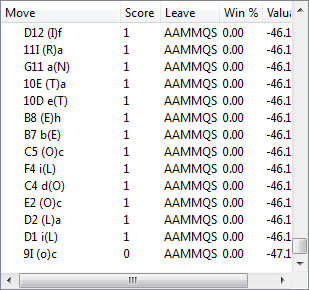
We see that Quackle generated one, and only one, move worth 0 point: 9I oc.
This is incorrect, as there are other playable words worth 0 point, for example 9I om that happens to be the only best move in the position (the idea being to play 8J MAQAMS on the next move).
The exact analysis of this endgame is available here.
Also, here's the game in gcg format for you to reproduce this in Quackle.
This is a particular case of all moves not being generated.
Here is an example between Nigel Richards and Harshan Lamabadusuriya, using the English tile distribution and the CSW15 lexicon, where passing is not evaluated.
Harshan has a 67 points leads and it's his turn.
Harshan's rack: FV
Nigel's rack: AADIZ
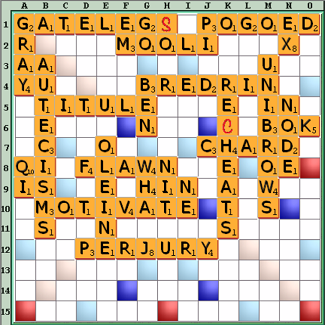
Here are the Championship Player's suggestions in Quackle:
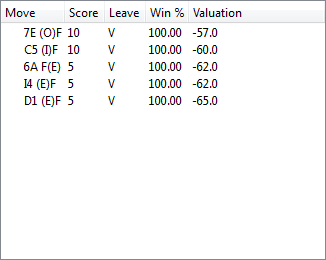
As one can see, passing is not evaluated, even though it happens to be the only winning move in this case (the idea being to keep the F to counter the PI D12 - AD 14D – ZA F14 setup).
The correct analysis is available here.
Also, here's the game in gcg format for you to reproduce this in Quackle.
Even in the endgame, Quackle uses heuristics and discards moves that don’t look promising. The advantage of doing so is that answers are given in a very short time. However, the major drawback is that the answers are only approximate.
Here is an example, using the French tile distribution and the ODS8 lexicon, where Quackle simply discards 11 winning moves.
You trail by 42 points and it's your turn.
Your rack: ?AAHITT
Your opponent's rack: PR
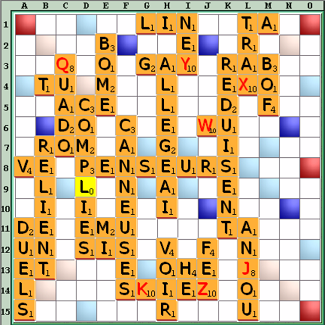
Here are the Championship Player's suggestions in Quackle:
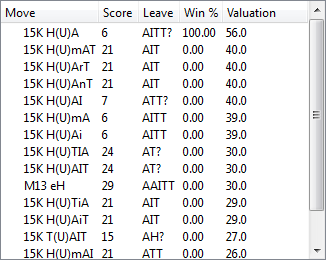
We see that she finds only one winning move that is, in fact, losing (the opponent simply has to drop his P at 10G after 15K HUA).
The winning moves all set up a huge play at O12. They all score less than 5 points and ten of them use a blank. However, a three-ply search would suffice to be sure that each of these moves is winning, since the opponent cannot block the setup. The 11 winning moves are:
The correct analysis of this move is available here.
You can also download the gcg file of the game to reproduce this in Quackle.
Consider the following example with the French tile distribution and the ODS8 lexicon.
You trail by 132 points and it's your turn.
Your rack: OR
Your opponent's rack: N
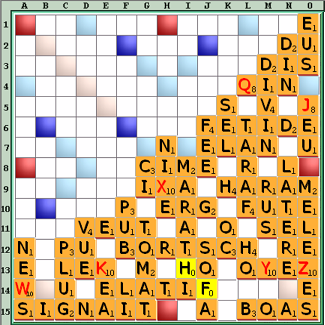
In this example, your opponent is stuck with his N and the only valid word that you can play is H12 ROT for 7 points, after which you will be stuck with your R.
Here are the Championship Player's suggestions in Quackle:
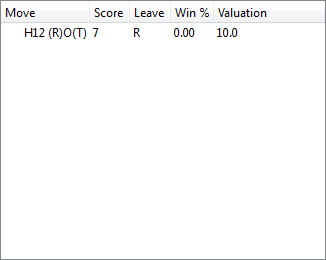
We see that H12 ROT has a 10 points valuation. This is incorrect, as after H12 ROT, and with optimal play, the players would score no point for six consecutive moves (six passes or challenged phonies) and they would each subtract the value of their leave from their total score. Since the N and the R are both worth 1 point in French, it means that the valuation of H12 ROT should be 7 points instead of 10 points.
You can download the gcg file of the game to reproduce this in Quackle.
Consider the following example with the French tile distribution and the ODS8 lexicon.
You trail by 67 points and it's your turn.
Your rack: ??EILOS
Your opponent's rack: BEW
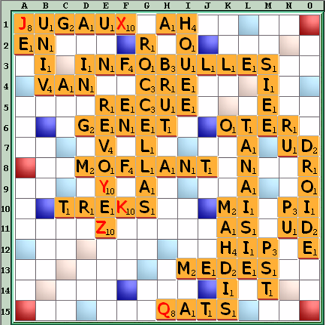
Here are the Championship Player's suggestions in Quackle. Worth noting is that she searches for about five seconds before giving these (wrong) results:
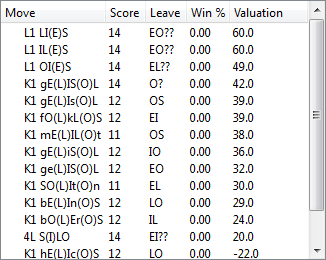
This endgame is difficult to solve because:
Nevertheless, one would expect to be able to set the engine to make it search longer than five seconds (during which it has clearly not considered every option); alas, that option does not exist in Quackle. This is in contrast with chess engines that will search until every possibility has been considered and regularly update their evaluations.
In this example, only one play out of the 5815 ones is winning: K1 fOL, with the idea of playing 4G CREEk and 5G RECUEIL forming FOLKLO at K1.
Sometimes, generating all moves and running static simulations in Quackle can help find good moves that were not in the Championship Player's top 15 recommendations. However, static simulations are of no help here and even after playing K1 fOL the Championship Player still thinks that you are lost.
The analysis of this endgame is available here.
Also, here's the game in gcg format for you to reproduce this in Quackle.
Even though to arrive at an evaluation one must have necessarily considered sequences of moves, Quackle does not provide these. It only tells the user that such move is worth X points, often forcing him to run multiple analyses to understand what is going on.
The Championship Player of Quackle only gives the 15 moves she finds to be best. One cannot force all moves to be analyzed and ranked by the endgame engine or force one particular move to be analyzed without running a complete analysis of the game.
In effect, the moves leading to the endgame position must all be encoded one by one, which is time consuming and tedious when all you care about is the endgame. It’s not possible to simply place the letters on the board, give the points difference with the opponent and run the analysis.
Return to home page
|
|
This site uses web cookies, click to learn more. Our privacy policy.
© Ortograf Inc. Updated on 14 June 2022. Informations & Contacts. |